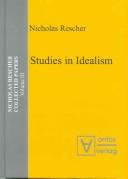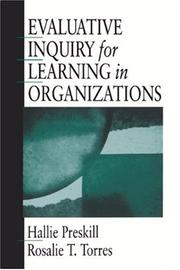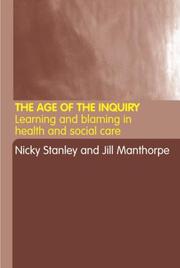| Listing 1 - 10 of 25 | << page >> |
Sort by
|

ISBN: 3110326329 9783110326321 9783937202815 3937202811 3110325373 9783110325379 3937202811 9783110325379 Year: 2005 Volume: 4 Publisher: Franfurt am Main: Ontos,
Abstract | Keywords | Export | Availability | Bookmark
 Loading...
Loading...Choose an application
- Reference Manager
- EndNote
- RefWorks (Direct export to RefWorks)
Book
ISBN: 1435628934 9781435628939 0791479269 Year: 2008 Publisher: Albany State University of New York Press
Abstract | Keywords | Export | Availability | Bookmark
 Loading...
Loading...Choose an application
- Reference Manager
- EndNote
- RefWorks (Direct export to RefWorks)
Every man and woman is located in two ways. One is stolidly physical: each human body has a unique address and trajectory. The other comes with beliefs that locate us by answering a salvo of questions: Who, what, and where am I? What are my relations to other people and things? Answers come with either of two emphases. Beliefs critical to practical life and science require that we engage familiar things or find our way in strange cities and streets. Such beliefs supply meaning and security. Ascribing significance to myself or my family, religion, or state, I tell a story that locates me within a world of purpose and value. Neighbors feel and valorize their lives as I do, so our story spreads to dominate a people or an era. One procedure—inquiry—favors reality testing and truth. The other—interpretation—uses meaning to appease vulnerability and glorify believers. Beliefs of these two kinds are sometimes joined, but they are often opposed and mutually hostile. Both philosophy and culture at large confuse these ways of thinking. Styles of Thought distinguishes and clarifies them.
Interpretation (Philosophy) --- Inquiry (Theory of knowledge) --- Imagination (Philosophy) --- Philosophy & Religion --- Philosophy --- Knowledge, Theory of
Book
ISBN: 131542133X 1611328977 9781611328974 Year: 2014 Publisher: Walnut Creek Left Coast Press
Abstract | Keywords | Export | Availability | Bookmark
 Loading...
Loading...Choose an application
- Reference Manager
- EndNote
- RefWorks (Direct export to RefWorks)
This volume of plenary addresses and other key presentations from the 2013 International Congress of Qualitative Inquiry shows how scholars convert inquiry into spaces of advocacy in the outside world. The original chapters engage in debate on how qualitative research can be best used to advance the causes of social justice while addressing racial, ethnic, gender, and environmental disparities in education, welfare, and health care. Twenty contributors from six countries and multiple academic disciplines present models, cases, and experiences to show how qualitative research can be used as an
Inquiry (Theory of knowledge). --- Qualitative research. --- Social advocacy. --- SOCIAL SCIENCE / Methodology.
Book
ISBN: 0191994227 0198886144 Year: 2024 Publisher: Oxford : Oxford University Press,
Abstract | Keywords | Export | Availability | Bookmark
 Loading...
Loading...Choose an application
- Reference Manager
- EndNote
- RefWorks (Direct export to RefWorks)
Recent work in the epistemology of inquiry transcends traditional epistemology, asking how agents should collect and assess evidence in order to decide what to believe. Thorstad links the epistemology of inquiry to the study of bounded rationality, proposing a novel theory of rational inquiry for bounded agents.
Inquiry (Theory of knowledge) --- Reason. --- Philosophy. --- Philosophy: epistemology & theory of knowledge.
Book

ISBN: 311056923X 3110561875 3110567687 9783110561876 9783110569247 3110569248 9783110569230 9783110567687 Year: 2018 Publisher: Berlin Boston
Abstract | Keywords | Export | Availability | Bookmark
 Loading...
Loading...Choose an application
- Reference Manager
- EndNote
- RefWorks (Direct export to RefWorks)
The effort to go beyond given knowledge in different domains - artistic, scientific, political, metaphysical - is a characteristic driving force in modernism and the avant-gardes. Since the late 19th century, artists and writers have frequently investigated their medium and its limits, pursued political and religious aims, and explored hitherto unknown physical, social and conceptual spaces, often in ways that combine these forms of critical inquiry into one and provoke further theoretical and methodological innovations. The fifth volume of the EAM series casts light on the history and actuality of investigations, quests and explorations in the European avant-garde and modernism from the late 19th century to the present day. The authors seek to answer questions such as: How have modernism and the avant-garde appropriated scientific knowledge, religious dogmas and social conventions, pursuing their investigation beyond the limits of given knowledge and conceptions? How have modernism and avant-garde created new conceptual models or representations where other discourses have allegedly failed? In what ways do practises of investigation, quest or exploration shape artistic work or the formal and thematic structures of artworks?
Modernism (Art) --- Modernism (Literature) --- Inquiry (Theory of knowledge) --- Knowledge, Theory of --- Avant-garde. --- modern art. --- modern literature. --- modernism.

ISBN: 1452231486 0585385483 0761904530 1452263175 9780585385488 9780761904533 0761904549 9780761904540 9781452231488 9781452263175 Year: 1999 Publisher: Thousand Oaks, Calif. : Sage Publications,
Abstract | Keywords | Export | Availability | Bookmark
 Loading...
Loading...Choose an application
- Reference Manager
- EndNote
- RefWorks (Direct export to RefWorks)
'Evaluative Inquiry for Learning in Organizations' shows a way to conduct evaluative inquiry in any kind of organisation. The approach is data-based, and the focus on use within organisations.
Organizational learning. --- Inquiry (Theory of knowledge) --- Knowledge, Theory of --- Learning organizations --- Learning --- Communities of practice --- Knowledge management

ISBN: 1134456654 0415283159 1299147232 1280052821 9786610052820 0203642724 9780203642726 9781134456604 1134456603 9781134456642 1134456646 9781134456659 0415283167 9780415283151 9780415283168 Year: 2004 Publisher: London Routledge
Abstract | Keywords | Export | Availability | Bookmark
 Loading...
Loading...Choose an application
- Reference Manager
- EndNote
- RefWorks (Direct export to RefWorks)
The plethora of inquiry reports published in the fields of health and welfare in the 1990s covered the full range of user groups, individuals and institutions. What similarities or differences were there between these inquiries? How effective were they in bringing about change? Whose interest did they best serve? These are some of the questions The Age of the Inquiry explores in detail, bringing together distinguished contributors with personal experience of chairing or providing evidence to inquiries to consider: the participant's view of inquiries the purpose of inquiries; the impact of inquiries on health and social policy; inquiries into: child abuse and death; homicides by mental health service users; the abuse of adults with; learning disabilities; the abuse of older people. Wide-ranging in scope, The Age of the Inquiry focuses on service and policy development. It provides an invaluable text for students, teachers and professionals from a wide range of disciplines and professional groups.
Social medicine --- Medicine --- Medical care --- Inquiry (Theory of knowledge) --- Questioning. --- Interrogation --- Socratic method --- Catechetics --- Teaching --- Knowledge, Theory of --- Health Workforce
Book
ISBN: 0892641207 0472901788 Year: 1996 Publisher: Ann Arbor : Center for Chinese Studies, University of Michigan,
Abstract | Keywords | Export | Availability | Bookmark
 Loading...
Loading...Choose an application
- Reference Manager
- EndNote
- RefWorks (Direct export to RefWorks)
Inquiry (Theory of knowledge) --- Social epistemology --- S12/0217 --- Epistemology, Social --- Knowledge, Theory of --- Social role --- Knowledge, Sociology of --- China: Philosophy and Classics--Epistemology --- China --- Civilization
Book
ISBN: 1526134969 1526155486 1526134950 Year: 2021 Publisher: Manchester : Manchester University Press,
Abstract | Keywords | Export | Availability | Bookmark
 Loading...
Loading...Choose an application
- Reference Manager
- EndNote
- RefWorks (Direct export to RefWorks)
Making the case for a pragmatist approach to social inquiry and knowledge production, sixteen contributors illustrate the power of pragmatism to inform democratic, community-centred, action-oriented research.
Pragmatism. --- Inquiry (Theory of knowledge) --- Community. --- Democracy. --- John Dewey. --- Knowledge production. --- Research philosophy. --- Research practice. --- Richard Rorty. --- Social inquiry. --- Social research.
Book
ISBN: 3031494911 Year: 2024 Publisher: Cham : Springer Nature Switzerland : Imprint: Palgrave Macmillan,
Abstract | Keywords | Export | Availability | Bookmark
 Loading...
Loading...Choose an application
- Reference Manager
- EndNote
- RefWorks (Direct export to RefWorks)
Universities have long been dominated by a philosophy of inquiry that may be called knowledge-inquiry. This holds that, in order to do justice to the basic humanitarian aim of helping to promote human welfare, academic inquiry must, in the first instance, seek knowledge and technological know-how. First, knowledge is to be acquired; once acquired, it can be applied to help promote human welfare. But this philosophy of knowledge-inquiry is an intellectual and humanitarian disaster. It violates three of the four most elementary rules of rational problem solving conceivable, and as a result fails to give priority to the task of helping humanity resolve those conflicts and problems of living, such as the climate and nature crises, that need to be resolved if we are to make progress to a better world – a world in which there is peace, democracy, justice, liberty, and sustainable prosperity, for all. Very few academics today are aware of this rationalityscandal. We urgently need to bring about a revolution in universities around the world, wherever possible, so that academic inquiry puts all four rules of rational problem solving into practice, and becomes rationally devoted to helping humanity learn how to make progress towards a better world. Knowledge-inquiry needs to become wisdom-inquiry, rationally devoted to helping humanity create a wiser world. Nicholas Maxwell is Emeritus Reader at University College London. He has devoted much of his working life to arguing we need to bring about a revolution in academia so that it comes to seek and promote wisdom and does not just acquire and apply knowledge. He has published fifteen books on this theme.
Inquiry (Theory of knowledge) --- Education --- Social sciences --- Knowledge, Theory of. --- Science --- Political science --- Philosophy of Education. --- Social Philosophy. --- Epistemology. --- Philosophy of Science. --- Political Philosophy. --- Philosophy.
| Listing 1 - 10 of 25 | << page >> |
Sort by
|

 Search
Search Feedback
Feedback About UniCat
About UniCat  Help
Help News
News